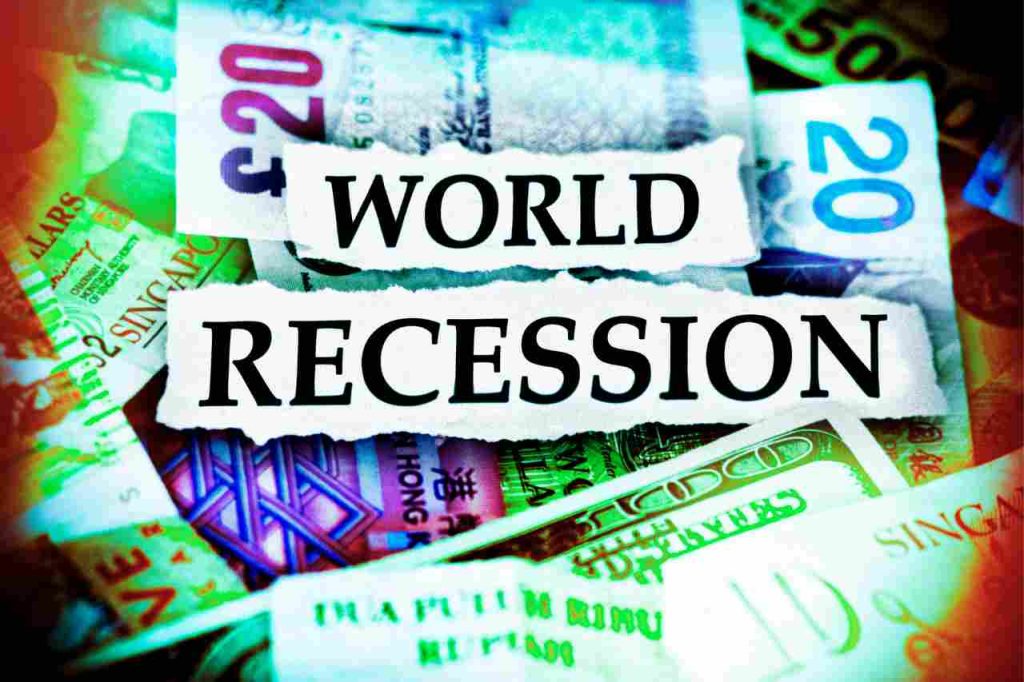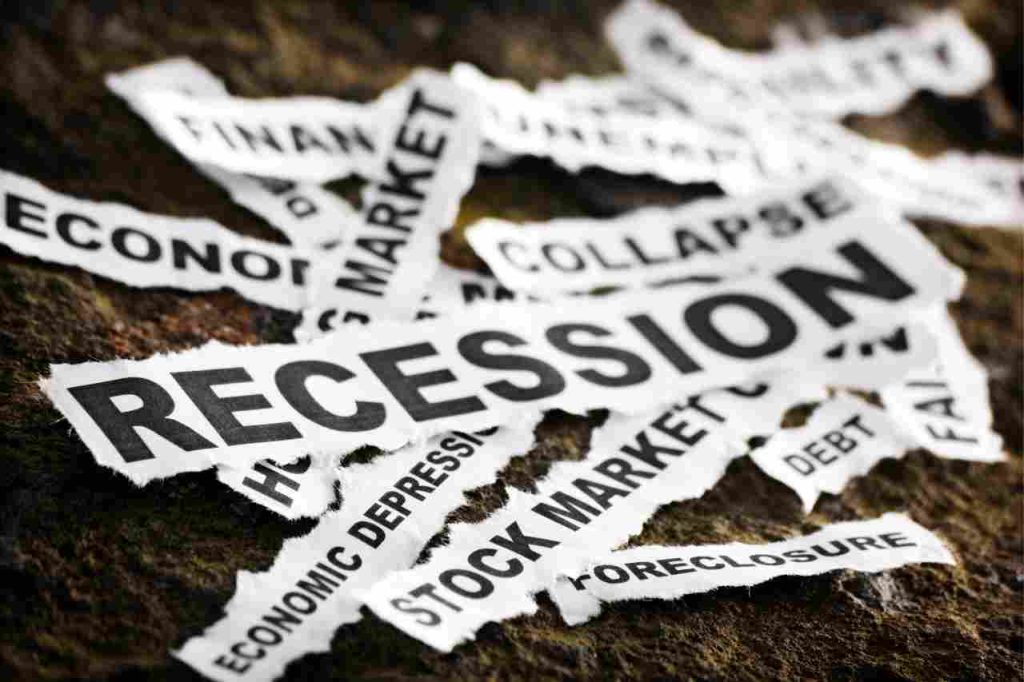Table of Contents
A recession is a period of economic downturn marked by a reduction in the GDP, an increase in the unemployment rate, and a decrease in consumer expenditure.
While recessions can be challenging for individuals and businesses alike, they can also present unique investment opportunities for those who know where to look.
Investing during a recession can be an effective way to build long-term wealth, but it’s essential to be aware of the risks and challenges involved.
We’ll explore the various opportunities and risks of investing during a recession and provide strategies for making the most of your investments.
Whether you’re a seasoned investor or just getting started, this article will provide you with the knowledge and tools you need to make informed investment decisions during a recession.

Opportunities during a recession
While a recession can be a challenging time for the economy, it can also present unique investment opportunities. Here are some of the most common options to consider during a recession:
Stock market
Overview of how the stock market behaves during a recession
Historically, stock markets tend to decline during recessions as investors become more cautious and seek to reduce their exposure to riskier assets.
Economic uncertainty, declining corporate profits, and rising unemployment rates can all contribute to a downward trend in stock prices.
It’s essential to note that not all sectors of the stock market are equally affected by recessions. Defensive sectors such as healthcare, consumer staples, and utilities may be less volatile during a downturn because they are less sensitive to economic cycles.
Additionally, the stock market may not necessarily linearly follow the broader economy. There have been instances where the stock market has rebounded even as the more overall economy remained in a recession, and vice versa.
Investors need to keep a long-term perspective and not get too caught up in short-term market movements.
While recessions can be challenging for investors, they can also present opportunities for those who can identify undervalued stocks and hold them over the long term.

Investing in undervalued stocks
Investing in undervalued stocks can be a lucrative strategy for investors who are willing to do their research and take a long-term view.
Here are some key considerations to keep in mind when investing in undervalued stocks during a recession:
Conduct thorough research: Before investing in any undervalued stock, it’s essential to conduct thorough research to understand why the stock is undervalued and what its long-term growth prospects are.
This may involve analyzing the company’s financial statements, management team, competitive landscape, and industry trends.
Look for stocks with solid fundamentals: While undervalued stocks may be trading at a discount for a reason, it’s essential to look for companies with strong fundamentals, such as a solid balance sheet, strong cash flow, and a proven track record of success.
This can help ensure that the company has the resources and resilience to weather the recession and emerge stronger on the other side.
Have a long-term outlook: Investing in undervalued stocks during a recession requires patience and a long-term perspective. It may take some time for the stock to reach its intrinsic value, and there may be periods of volatility along the way.
However, if the underlying fundamentals of the company are strong, holding onto the stock over the long term can potentially result in significant returns.
Diversify your portfolio: As with any investment strategy, it’s essential to diversify your portfolio to minimize risk. Investing in various undervalued stocks across different sectors and industries can help spread risk and potentially increase returns.

Investing in defensive stocks
Investing in defensive stocks can be a good strategy for investors who are looking to minimize their risk exposure during a recession.
Here are some key considerations to keep in mind when investing in defensive stocks:
Look for companies with stable cash flows: Defensive stocks tend to have durable business models that generate steady cash flows, regardless of economic conditions.
For example, utilities are considered defensive stocks because they provide essential services that are unlikely to be impacted by a recession.
Consider the company’s dividend history: Many defensive stocks pay dividends, which can provide a steady stream of income for investors.
When considering a defensive stock, it’s essential to look at the company’s dividend history and assess its ability to maintain or increase its dividend payout over time.
Be mindful of valuation: While defensive stocks may be less volatile than other types of stores during a recession, they may also be more expensive due to their perceived stability. When investing in defensive stocks, it’s essential to pay attention to valuation and avoid overpaying for a store.
Diversify your portfolio: As with any investment strategy, it’s essential to diversify your portfolio to minimize risk. Investing in various defensive stocks across different sectors and industries can help spread risk and potentially increase returns.
Real estate
Overview of how the real estate market behaves during a recession
During a recession, the real estate market typically experiences a decline in demand, leading to lower property values and increased foreclosures.
While this can be challenging for homeowners and real estate investors, it can also create opportunities for investors looking to acquire distressed properties at a discount.
Investing in distressed properties
Distressed properties are those that are in foreclosure or are being sold at a steep discount due to financial difficulties.
Investing in distressed properties can be a way to acquire real estate assets at a fraction of their market value and potentially earn significant returns over the long term.

Investing in real estate investment trusts (REITs)
REITs are companies that own and manage income-producing real estate properties, such as apartments, office buildings, and shopping centers.
During a recession, some REITs may experience declines in value, creating opportunities for investors to purchase shares at a discount.
Investing in REITs can be a way to gain exposure to the real estate market without purchasing physical properties.
Commodities
Overview of how entities perform during a recession
During a recession, demand for items such as oil, metals, and agricultural products may decline due to decreased consumer spending and economic activity.
However, some commodities may still perform well due to their value as a safe-haven asset or their use in essential industries.
Investing in precious metals
Precious metals such as gold and silver are often viewed as safe-haven assets during times of economic uncertainty.
This is because they tend to hold their value even when other investments are declining in value. Investing in precious metals can be a way to hedge against inflation and economic uncertainty.
Investing in energy
While energy demand may decline during a recession, some energy companies may still perform well due to their involvement in essential industries such as utilities and transportation.
Additionally, some alternative energy sources, such as solar and wind, may experience increased demand as governments and consumers seek to reduce their reliance on fossil fuels.
Investing in energy can be a way to gain exposure to a diverse range of industries and potentially earn steady returns over the long term.

Risks of investing during a recession
While investing during a recession can present unique opportunities, it also carries certain risks.
Here are some of the most common risks to consider when investing during a recession:
Market volatility
Overview of how market volatility can affect investments
During a recession, the stock market and other investment markets may experience high levels of volatility, which can cause significant fluctuations in the value of assets.
This can be particularly challenging for investors who are looking to make short-term gains or who have a low tolerance for risk.
Importance of diversification
Diversification is a strategy that involves investing in a wide range of assets and industries to minimize risk. During a recession, it’s imperative to diversify your investments to mitigate the impact of market volatility.
This can help ensure that your portfolio is well-positioned to weather economic downturns and potentially earn steady returns over the long term.
Credit risk
Overview of how credit risk can affect investments
Credit risk refers to the risk of default on loans or other forms of debt. During a recession, credit risk can increase as borrowers struggle to repay loans or as interest rates rise.
This can impact the value of investments that are tied to credit markets, such as corporate bonds.
Importance of investing in high-quality bonds
Investing in high-quality bonds, such as those issued by governments or highly-rated corporations, can be a way to mitigate credit risk during a recession.
These bonds tend to be less risky than lower-quality bonds and may offer more stable returns over the long term.

Liquidity risk
Overview of how liquidity risk can affect investments
Liquidity risk refers to the risk of being unable to sell an asset when needed due to a lack of buyers or market conditions.
During a recession, liquidity risk can increase as investors become more risk-averse and demand for certain assets declines.
Importance of having a sufficient emergency fund
Having a sufficient emergency fund can be a way to mitigate liquidity risk during a recession.
This fund should consist of liquid assets, such as cash or money market funds, that can be easily accessed during an emergency or unexpected expenses.
This can help ensure that you don’t have to sell investments at a loss to cover expenses.
By doing this, you can avoid having to sell investments at a loss in order to pay bills.
It’s essential to have a well-diversified portfolio that considers your risk tolerance, investment goals, and time horizon.
A great method to make sure that your investments are in line with your long-term financial objectives is to get expert guidance from a financial adviser.
Strategies for investing during a recession
Investing during a recession may be difficult, but there are a number of tactics that investors can employ to take advantage of the chances and perhaps reduce the dangers.
Here are some strategies to consider:
Dollar-cost averaging
Overview of how dollar-cost averaging works
Dollar-cost averaging is a strategy that involves investing a fixed amount of money at regular intervals, regardless of market conditions.
This can be a way to potentially take advantage of market downturns by buying more shares when prices are low.
Benefits of dollar-cost averaging during a recession
During a recession, the stock market may experience significant volatility, which can be daunting for investors.
Dollar-cost averaging can help mitigate this risk by allowing investors to take advantage of market downturns without having to time the market.

Value Investing
Overview of value investing
Value investing is a strategy that involves investing in stocks that are trading below their intrinsic value.
These stocks are often considered undervalued by the market and may offer significant upside potential.
Benefits of value investing during a recession
During a recession, many stocks may experience significant price declines. This can create opportunities for value investors to identify undervalued stocks and potentially earn substantial returns over the long term.
Defensive investing
Overview of defensive investing
Defensive investing is a strategy that involves investing in companies or sectors that are less sensitive to economic cycles.
These companies may have stable earnings, and strong balance sheets and may be less likely to experience significant declines in value during a recession.
Benefits of defensive investing during a recession
During a recession, defensive stocks may offer more stable returns than other types of investments.
This can be a way to mitigate the impact of market volatility potentially and potentially earn steady returns over the long term.
Rebalancing
Overview of rebalancing
Rebalancing is a strategy that involves periodically adjusting your portfolio to maintain a desired asset allocation.
This can involve selling assets that have performed well and reinvesting the proceeds in assets that have underperformed.
Benefits of rebalancing during a recession
During a recession, certain asset classes may experience significant declines in value, which can throw off your portfolio’s asset allocation.
Rebalancing can be a way to restore your portfolio’s desired asset allocation and potentially take advantage of market downturns by buying assets that have become relatively cheap.
Investing during a recession may be difficult, but there are a number of tactics that investors can employ to take advantage of the chances and perhaps reduce the dangers.
It’s essential to carefully consider your risk tolerance, investment goals, and time horizon before implementing any investment strategy.
A great method to make sure that your investments are in line with your long-term financial objectives is to get expert guidance from a financial adviser.
Conclusion
Investing during a recession can be an opportunity to earn significant returns potentially, but it also carries certain risks that should be carefully considered.
Market volatility, credit risk, and liquidity risk are just a few of the risks that investors should be aware of when investing during a recession.
Fortunately, there are several strategies that investors can use to capitalize on the opportunities and mitigate the risks potentially.
Dollar-cost averaging, value investing, defensive investing, and rebalancing are just a few of the strategies that investors can use to earn steady returns over the long-term potential.
Ultimately, the key to successful investing during a recession is to have a well-diversified portfolio that considers your risk tolerance, investment goals, and time horizon.
A great method to make sure that your investments are in line with your long-term financial objectives is to get expert guidance from a financial adviser. It is possible to enhance your wealth over the long run by investing during a recession with proper preparation and a disciplined strategy.










